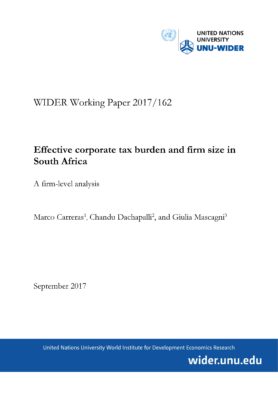UNU-WIDER Working Paper 162
Business profit taxation recently became a topic of particular interest in Africa. The tax burden on firms is crucial for industrial development, which is one of the key components of development policy more broadly. Governments have to strike the right balance between collecting enough revenue to finance the basic functions of the state, promoting equity and redistribution in society, and building an enabling environment for businesses to prosper. Against this background, several studies have focused on the broad issue of business taxation, ranging from evaluation of fiscal incentives (Kinda 2014; Klemm 2010; Klemm and Van Parys 2012) and microeconomic evaluations of the tax burden on firms (Gauthier and Reinikka 2006; Mascagni and Mengistu 2016). Our work relates particularly to the latter and focuses on the tax burden of corporate businesses in South Africa. We build on existing literature on this topic, especially on evidence from African countries, and South Africa in particular. A key such reference is the report of the Davis Tax Committee (2015), which provides a comprehensive review of the tax system of South Africa and its links to economic growth. We build on this body of work and add to it by providing a more focused and detailed analysis of the corporate income tax (CIT) burden across the size distribution.
